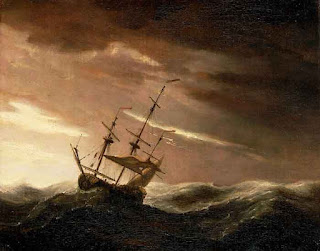Oh my God, please help me!
 The sailors were terrified, and each one cried out to his god. They hurled the cargo that was in the ship into the sea to make it lighter. Now Jonah had gone down into the hold of the vessel to lie down and was deep in sleep. Jonah 1:5
The sailors were terrified, and each one cried out to his god. They hurled the cargo that was in the ship into the sea to make it lighter. Now Jonah had gone down into the hold of the vessel to lie down and was deep in sleep. Jonah 1:5"Most sailors are pious." -The Talmud
"He that would learn to pray, let him go to sea." -George Herbert
Have you ever really been in trouble and cried out to God? It was probably not at a church or religious meeting. It happened to me in the ocean. I cried out for God to save me and a man named James did. Other people I know have had a similar experience in the hospital. I know someone else who cried out to God while in a plane that was in real danger.
When you are in a real crisis, it's just you and you need God's help. I was alone, without my friends, family, church, car, or home. It was just me in the mighty ocean. As big and powerful as the ocean is, God is bigger and more powerful. I had the most profound experience of being in need of God's intervention. That was the experience of the sailors in Jonah's story.
The sailors also threw all of their cargo overboard to lighten the ship's load. In the storm that was so powerful that they knew it could wreck their ship, they not only called out to their gods, but they did what they could do to make the ship lighter, which would make it ride the storm better. They gave up their commercial enterprise and took the loss of their goods in order to try to save themselves.
The text says that "each one cried out to his own god". This is a matter of fact statement that these sailors were probably not believers in the the God of of the Hebrews. The point I think that the writer of the story makes is not to evaluate the sailors theology, but to take note of their ardent prayers. They were grabbing for the only levers they knew.
We don't know the theology of the sailors, but we do know that they were crying out to God or a god in their own way. Perhaps the main reason that the author notes this is to contrast their actions to what Jonah was doing or not doing at the same time.
There are many people who believe, but don't belong to a fellowship of believers. There are also many people who belong to the fellowship of believers, who themselves are not believers. We can be fooled into believing that attending religious meetings and even serving and knowledge make one a believer. There are people who are members and even leaders who are only doing so because it "looks good". It looks good on your life resume. But that person's secret relationship with God is zero.
There are many people who like Jesus but are put off with the church. Church people think that these folks need to get in line and come home. But what if the truth is that the church is full of unbelieving believers and the world is full of wandering saints? What if the pagan sailors in Jonah's story were closer to the heart of God than his chosen Prophet?
The word "church" is very misunderstood today. Most people know that it does not mean "building". But it also does not mean institution or service or system or club-house, nor class-room, army, hospital, nor ministry. Church means gathering. A gathering is a group of people. It has nothing to do with a pastor preaching or offerings taken or a worship services. These are all traditions that we've added on. When Jesus said, "I will build my church", he was saying he would build his group of people, gathered around him; who he later said would, "go into all the earth to preach and make disciples".
What does that have to do with Jonah's story? The point is that God is all about saving people and calling people to himself. The story of Jonah gets us out of the building and into the streets. Where is God? Is God there at your religious meeting and you go there to find God and feel good being with God? Or is God on the streets and in the ship in danger on the high seas? Isn't the meeting a place to go to after having adventures with God among people who don't know Him? Look at Jesus with his disciples around the fire at night, gathered.
What if this ship with it's sailors on the ocean is a picture of the the people of our world in a storm. The people of God, who know God, who have the good news are there too; but off in a corner, asleep! That's bad news. But the good news is that the center of God's story and God's plan is not his people or his called and activated ones. God is the center. It is His story. God uses people, but people do not bring salvation. The message remains true even when the messengers are flawed. God being God, has work-arounds.
Comments
Post a Comment